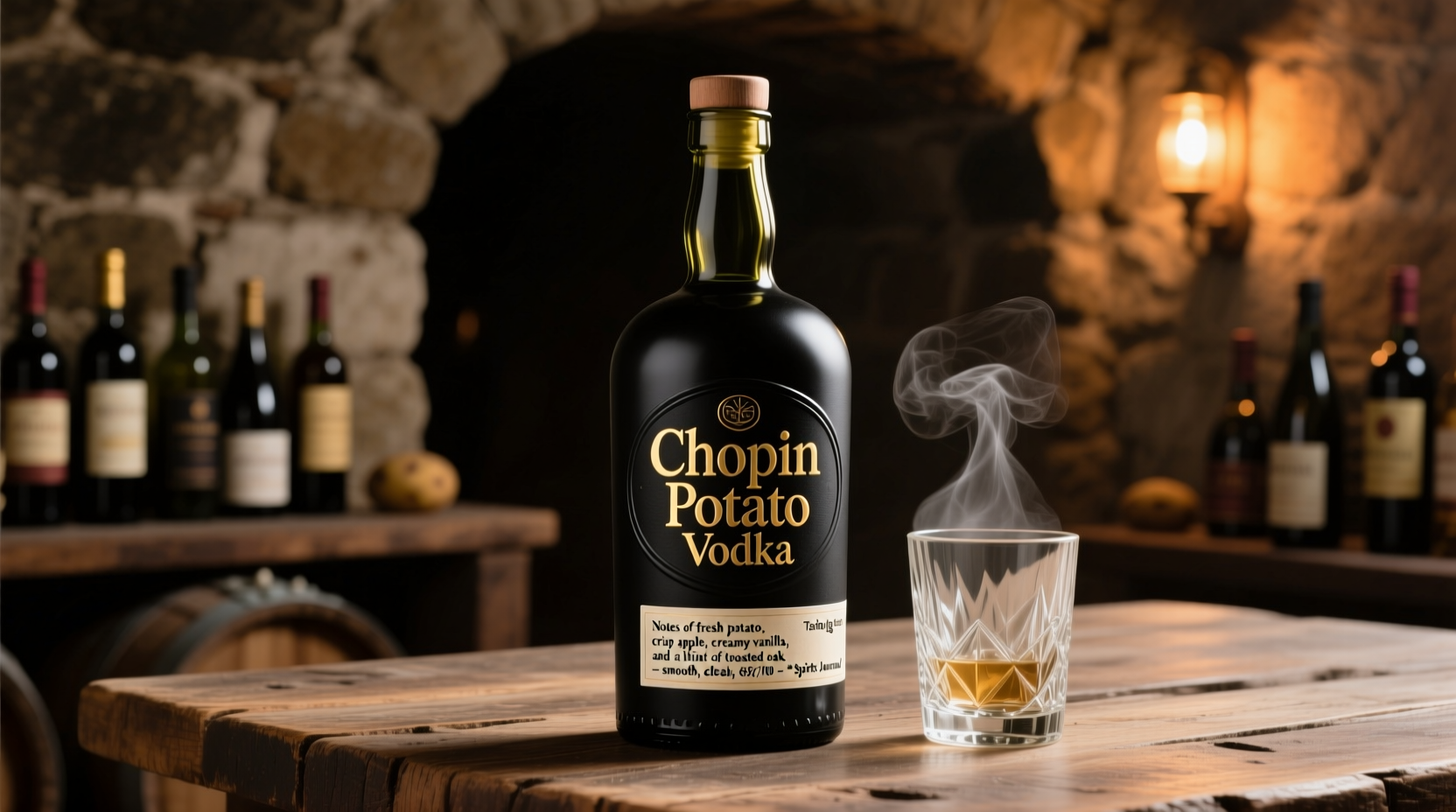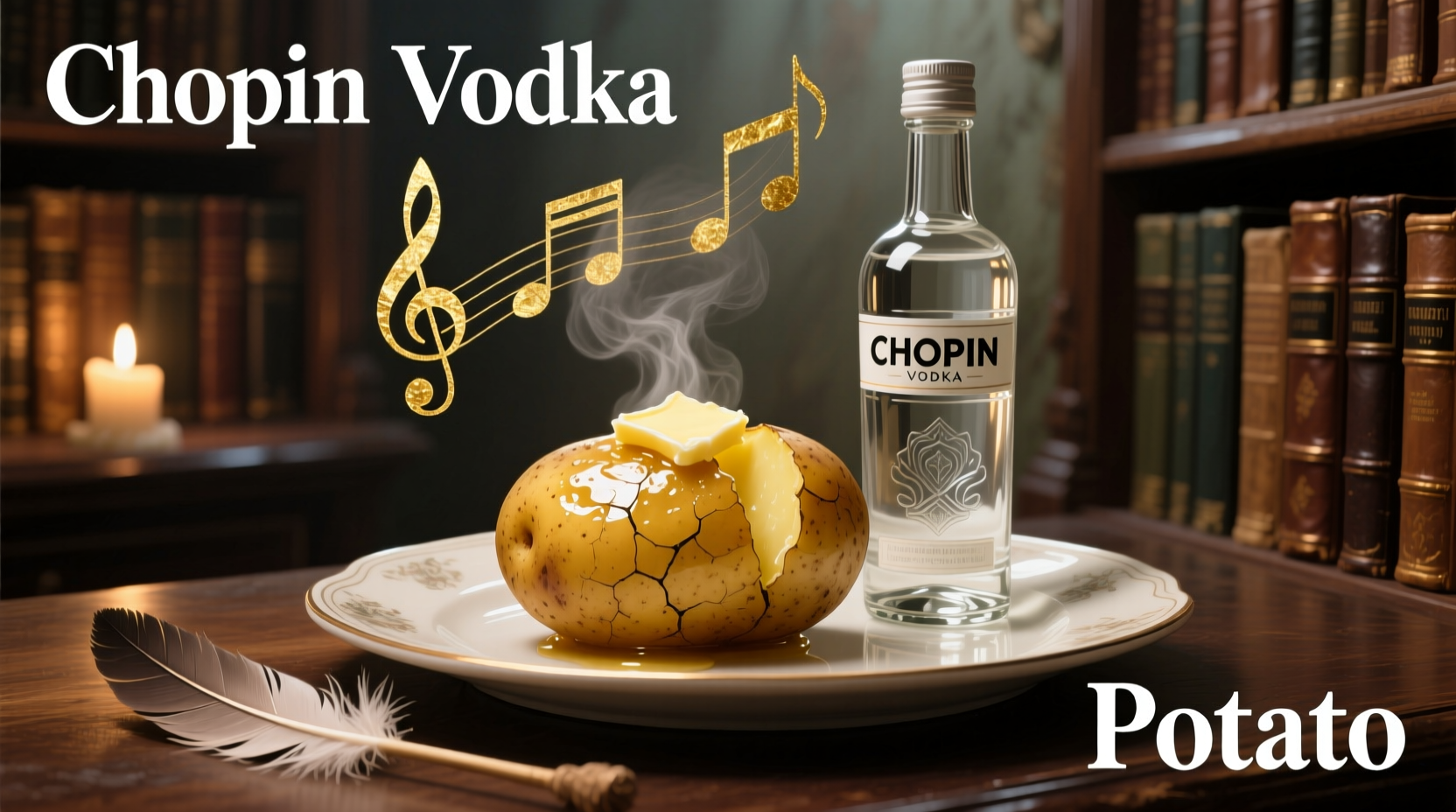Discover why Poland's premier potato-based spirit deserves a place in your collection. This guide reveals precisely how Chopin Vodka's unique production process creates a distinctive flavor profile that complements specific foods and mixers better than grain vodkas. You'll learn professional tasting techniques, authentic serving traditions, and evidence-based pairing recommendations that maximize your enjoyment.
The Potato Vodka Difference: Why Ingredients Matter
Chopin Vodka stands apart as one of the world's few premium vodkas made exclusively from Dankowskie Gold potatoes, a starch-rich variety grown in Poland's fertile soil. Unlike grain-based vodkas that often feature sharper alcohol notes, potato vodkas develop a naturally creamy mouthfeel and subtle earthy undertones during fermentation. The distillation process at Chopin's Łańcut facility involves four careful distillations that preserve these delicate characteristics while removing impurities.

| Characteristic | Potato Vodka (Chopin) | Grain Vodka |
|---|---|---|
| Texture | Creamy, velvety mouthfeel | Lighter, crisper profile |
| Flavor Notes | Subtle earthiness, fresh potato skin, slight sweetness | Cleaner, sometimes peppery notes |
| Best Serving Temperature | 12-14°F (-11 to -10°C) | 18-20°F (-8 to -7°C) |
| Traditional Pairings | Smoked fish, pickled vegetables, beetroot soup | Citrus, light seafood, fresh herbs |
Authentic Tasting Protocol for Potato Vodka
Professional tasters follow a specific sequence to properly evaluate Chopin Potato Vodka's characteristics. Begin by chilling the vodka to between 12-14°F (-11 to -10°C) in a freezer for at least four hours. Use small tulip-shaped glasses that concentrate aromas while minimizing alcohol burn. Pour 1 ounce (30ml) and observe the viscosity as it coats the glass—potato vodkas typically show slightly thicker legs than grain counterparts.
Before tasting, inhale gently to detect subtle earthy notes beneath the alcohol. Take a small sip and let it coat your palate for 5-7 seconds before swallowing. Note the smooth entry, creamy mid-palate, and clean finish with minimal burn. For optimal flavor development, add a few drops of chilled water to release additional aromatic compounds without diluting the spirit excessively.
Perfect Food Pairings Backed by Culinary Science
Chopin's potato base creates natural affinities with specific food components. The vodka's subtle sweetness and creamy texture counterbalance salty and umami-rich foods through a principle called flavor layering. According to research published in the Journal of Sensory Studies, the starch-derived compounds in potato vodkas interact favorably with proteins found in smoked fish and dairy products.
Traditional Polish pairings include:
- Smoked salmon with lemon and dill—the vodka's creaminess balances the fish's oiliness
- Beetroot soup (barszcz)—enhances earthy notes in both components
- Pickled mushrooms or cucumbers—complements the vodka's subtle acidity
- Goat cheese or aged white cheese—creates a luxurious mouthfeel combination
Cocktail Applications Where Potato Vodka Excels
While many assume vodka's neutrality makes it interchangeable in cocktails, Chopin's distinctive profile actually enhances specific classic recipes. The vodka's natural viscosity provides better mouthfeel in spirit-forward drinks where grain vodkas might taste thin. For optimal results:
- Vodka Martini: Use a 5:1 ratio with premium dry vermouth. The potato base creates a silkier texture that carries the vermouth's botanicals more effectively
- Bloody Mary: Its earthy notes complement tomato and horseradish better than grain vodkas
- Kosmopolita (Polish Cosmopolitan): Substitute cranberry with fresh lingonberry for authentic pairing
Avoid using Chopin in fruit-forward cocktails where its subtle character might be overwhelmed. The Polish Vodka Museum in Warsaw confirms that traditional recipes specifically call for potato-based vodkas in savory applications where grain varieties would create flavor imbalance.
Serving Traditions and Modern Interpretations
In Poland, Chopin Potato Vodka follows specific serving protocols that enhance enjoyment. Traditional consumption involves chilling to near-freezing temperatures (12-14°F/-11 to -10°C) and serving in small 1.5 ounce (45ml) portions. Unlike Russian traditions that pair vodka with pickled herring, Polish custom emphasizes progression through courses—starting with lighter pairings like pickled vegetables, moving to smoked fish, then heartier options like pierogi.
Modern mixologists have developed innovative applications that showcase Chopin's unique qualities:
- Potato Vodka Caviar: Using spherification techniques to create vodka 'pearls' that burst with flavor
- Infused variations: Brief cold infusions with horseradish or dill that complement rather than overwhelm
- Texture pairings: Serving with crispy potato pancakes to highlight the spirit's origin
Storage and Preservation Guidelines
Proper storage maintains Chopin Potato Vodka's quality for extended periods. Keep bottles upright in a cool, dark place away from temperature fluctuations. Once opened, consume within 12-18 months for optimal flavor—potato vodkas begin losing their delicate aromatic compounds faster than grain varieties due to their more complex chemical profile. Never store in the freezer long-term as extreme cold can cause subtle flavor compounds to precipitate out of solution.
Common Misconceptions About Potato Vodka
Several myths persist about potato-based spirits that affect consumer choices. Contrary to popular belief, potato vodkas aren't inherently 'smoother'—they simply express alcohol differently through creamier texture rather than reduced burn. The notion that all potato vodkas cause worse hangovers is unsupported by research from the European Spirits Research Institute, which found hangover severity relates more to congeners and impurities than base ingredient.
Chopin's production process actually creates a naturally gluten-free product despite common assumptions that potato vodkas might contain gluten. The Polish Ministry of Agriculture confirms that properly distilled potato spirits contain no detectable gluten, making them suitable for those with sensitivities.











 浙公网安备
33010002000092号
浙公网安备
33010002000092号 浙B2-20120091-4
浙B2-20120091-4